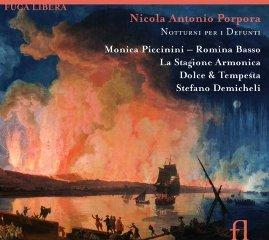Porpora: Notturni per i Defunti - Fiorenza: Sinfoniae (2007)
Porpora: Notturni per i Defunti - Fiorenza: Sinfoniae (2007)

Nicola Porpora: Notturno dei defonti No. 1 1.Lezione I: Parce mihi Domine (Soprano) 2.Responsorio: Credo quod Redemptor meus vivit 3.Lezione II: Taedet animam meam (Alto) 4.Responsorio: Qui Lazarum resuscitasti 5.Lezione III: Manus tuae fecerunt me (Soprano) 6.Responsorio: Domine quando veneris Nicola Fiorenza: Sinfonia in F Minor 7.I. Largo 8.II. Allegro 9.III. Largo 10.IV. Allegro Nicola Porpora: Notturno dei defonti No. 2 11.Lezione I: Responde mihi (Soprano) 12.Responsorio: Memento mei Deus 13.Lezione II: Homo natus de muliere (Soprano) 14.Responsorio: Hei mihi Domine 15.Lezione III: Quis mihi hoc tribuat (Alto) 16.Responsorio: Ne recorderis Nicola Fiorenza: Sinfonia for Cello and Violins in F Major 17.I. Largo 18.II. Allegro 19.III. Largo 20.IV. Non presto Nicola Porpora: Notturno dei defonti No. 3 21.Lezione I: Spiritus meus (Soprano) 22.Responsorio: Peccantem me quotidie 23.Lezione II: Pelli meae consumptis carnibus (Alto) 24.Responsorio: Domine secundum actum meum 25.Lezione III: Quare de vulva (Alto) Monica Piccinini (Soprano) Romina Basso (Alto) La Stagione Armonica, Dolce & Tempesta Stefano Demicheli - conductor
An outstanding Italian musician, Stefano Demicheli René Jacobs' closest assistant for a very long time, and has performed with him on many of Europe's main opera stages. A distinguished harpsichordist, who studied with Ottavio Dantone, he is now the leader of the Dolce & Tempesta ensemble, comprising of the best soloists from top European period instrument ensembles. Their first recording is resolutely original, and includes the world premières of the three 'Notturni' composed in c.1740 by Porpora for the All Souls Day in Naples. Carried by one of the most powerful expressive texts in the Christian religion, Monica Piccinini and Romina Basso, accompanied by the Stagione Armonica, offer a nice discovery, full of surprises. Also included are the two highly seductive 'Sinfoniae' by Fiorenza, which give the finishing touch to this major new release! --- arkivmusic.com
Nicola Porpora, if he is known at all, is recognized as Franz Josef Haydn's only music teacher of consequence and as the benevolent figure who rescued Haydn from a life of destitution and homelessness on the streets of Vienna. Still others may know of Porpora as a composer who went up against Handel's popularity in London in the 1730s, only to fail like so many others who tried. Porpora was clearly more significant than just these events would indicate, and though by this writing in October 2007 Porpora's scant instrumental output has been recorded in great deal, little exposure has been given to the area where he truly excelled; vocal music, mainly sacred music, cantatas, and opera. Italian label Fuga Libera has made an important contribution to Porpora's cause in recording Nicola Antonio Porpora: Notturni per I Defunti, featuring singers Monica Piccinini and Romina Basso fronting the chorale La Stagione Armonica and the period chamber orchestra Dolce & Tempesta under Stefano Demichelli.
In this context, the term "Notturni" does not refer to the term in the sense applied by Haydn (i.e., just another word to describe a divertimento), but to the service of Nocturns (or Matins); night prayers, in this case specifically the office for the dead. These only would have been said at the death of a prominent person within the church or community or in observance of All Souls' Day, marked in the liturgical calendar on November 2. As these services were written in Naples for the Conservatorio di S. Maria de Loreto between 1739 and 1742 and no one of such prominence died during this period, the latter purpose is most likely. The surviving manuscript material for Porpora's three-part office is a mess and shows signs of a hasty revision made for a revival of the work made in 1760. The lessons are all intact, but little survives of the vocal parts belonging to the responses and the final response, "Libera me Domine," is missing. Although he opted to decline on recomposing the "Libera me" as would have been necessary, Demichelli has scrupulously rebuilt the rest of the responses based on the music that is left. The high quality of this work is borne out by the fact that one cannot tell where Porpora's full score leaves off and the reconstructed material begins; it is seamless and reads as all of a piece.
Porpora's vocal writing retains some measure of Vivaldi's influence, but it is more toned down in terms of ornamentation. Piccinini and Basso handle it all artfully and very well, though Basso seems a little tripped up at the torturously difficult figure that concludes the "Quis mihi hoc tribuat" in the second Nocturne. The playing of Dolce & Tempesta and the singing of La Stagione Armonica is marvelously relaxed and restrained; after all, you're not looking to wake the dead so much as simply offer prayer on behalf of the dearly departed. The most marvelous aspect, however, of Fuga Libera's Nicola Antonio Porpora: Notturni per I Defunti is the music itself; its hushed, humble mysterious quality, emotionally moving sobriety of expression, and intoxicating harmonic colors make the listener want to hear more of Porpora. In addition to the main part of the program, three intriguing symphonies of completely unknown Neapolitan composer Nicolo Fiorenza are likewise included, an inspired choice of filler. --- Uncle Dave Lewis, Rovi
download (mp3 @320 kbs):
yandex 4shared mega mediafire zalivalka cloudmailru uplea








